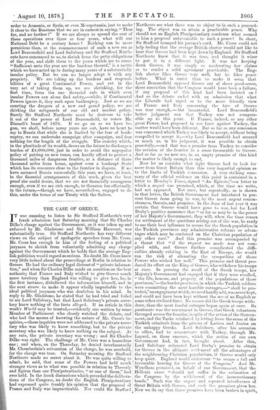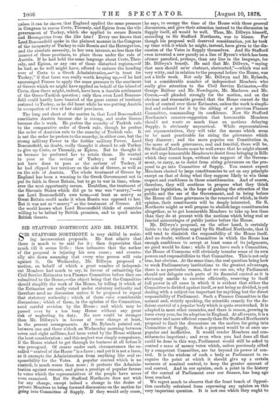THE CASE OF GREECE.
IT was amusing to listen to Sir Stafford Northcote's very frank admission last Saturday morning that Sir Charles Dike's charge against the Government, as it was taken up and enforced by Mr. Gladstone and Sir William Harcourt, was substantially true. Sir Stafford Northcote has very different views on the subject of apologetic speeches from Mr. Cross. Mr. Cross has enough in him of the feeling of a political juryman to shrink from voluntarily admitting any charge against the Government which he holds that the average Eng- /ish politician would regard as serious. No doubt Mr. Cross knew very little indeed about the proceedings at Berlin in relation to Greece. He had the ordinary legal distrust of "private informa- tion," and when Sir Charles Dilke made an assertion on the best authority that France and Italy wished to give Greece much more territory than England was willing to give her, he, in the first instance, disbelieved the information himself, and in the next strove to make it appear wholly improbable to the ideal political juryman who was doubtless in his mind. In reply to Mr. Gladstone, he stated that he had tried and failed to see Lord Salisbury, but that Lord Salisbury's private secre- tary knew nothing of the facts alleged. If an article in this week's World may be trusted,—evidently one written by some Member of Parliament who closely watched the debate, and who had the means of knowing the nature of Mr. Cross's in- quiries,—these inquiries were not addressed to the private secre- tary who was likely to know something, but to the private secretary who was likely to know nothing on the subject. At any rate, the private secretary was wrong ; and Sir Charles Dilke was right. The challenge of Mr. Cross was a hazardous one ; and when, on the Thursday, he denied interlocutorily Mr. Chamberlain's reiteration of the charge, he was overbold, for the charge was true. On Saturday morning Sir Stafford Northcote made no secret about it. He was quite willing to admit, he said, that some of the Powers had held much stronger views as to what was possible in relation to Thessaly and Epirus than our Plenipotentiaries, "or one of them," had ever held. In the frank discussions which preceded the delibera- tions of the Congress, no doubt the English Plenipotentiary had expressed quite frankly his opinion that the proposal of France and Italy was impracticable. Nor could Sir Staffordl
Northcote see what there was to object to in such a proceed- ing. The object was to attain a practicable peace. Why should not an English Plenipotentiary condemn what seemed to him a proposal unfavourable to such a peace ? In short, Sir Stafford trumped his partner's card. Mr. Cross could not help feeling that the average British elector would not like to hear that Greece had been kept down by England. Sir Stafford Northcote knew that it was true, and thought it wiser to put it in a different light. It was not keeping down Greece, it was simply so moderating her claims as to render a solid agreement practicable. The Eng- lish elector likes Greece very well, but he likes peace better. What is easier than to make it seem that Lord Beaconsfield opposed Greece out of sheer good-sense, sheer conviction that the Congress would have been a failure, if any proposal of this kind bad been insisted on ? And so the debate ended with an admission that what the Liberals had urged as to the more friendly view of France and Lary concerning the fate of Greece was true enough,— but immaterial. Lord Beaconsfield's better judgment saw that Turkey was not compres- sible up to this point. If France, indeed, or any other great Power, had proposed to use force against Turkey, the matter would have been different. But so far as any concession was concerned which Turkey was likely to accept, without being compelled to accept it,—why Lord Beaconsfield had secured as much as, in his judgment, it was possible to obtain peacefully,—and that was a promise from Turkey to consider the revision of the frontier in a sense favourable to Greece. And so far as we now see, in an empty promise of this kind the matter is likely enough to end.
Now let us consider what right Greece had to look for more from Great Britain than this very impartial opinion as to the limits of Turkish concession. A very striking sum- mary of the official evidence on this point is contained in a letter to Monday's Times, signed " An Epirote,"—a letter to which a sequel was promised, which, at the time we write, had not appeared. Not once, but repeatedly, as is shown in that letter, the British Government had interfered to pre- vent Greece from going to war, by the most urgent remon- strances, threats, and promises. In the June of last year it was certain that Greece would have gone to war, but for Lord Derby's positive assurance that "so far as may be in the power
of her Majesty's Government, they will, when the time cornea for settlement of the questions arising out of the war, be ready to use their best influence to secure for the Greek population in the Turkish provinces any administrative reforms or advan- tages which may be conferred on the Christian population of any other race." And this promise was accompanied by a threat that "if the request we made was not com- plied with, and Greece further complicated the diffi- culties already existing in the East of Europe, she would run the risk of alienating the sympathies of those Powers who wished her well." This promise and threat pro- duced its effect on the King of Greece, who withdrew his troops at once. In pressing the recall of the Greek troops, her Majesty's Government had engaged that if they were recalled, "the life, honour, and property of the populations of those provinces,"—the border provinces, in which the Turkish soldiers were committing the most horrible outrages,—" shall be pro- tected," an engagement which, we need hardly add, was never kept, and could not have been kept without the use of an English or some other civilised force. No sooner did the Greek troops with- draw, than the most fearful outrages began again at once. So passionate was the resentment in Greece, that Greek volunteers thronged across the frontier, in spite of the action of the Govern- ment, and the Turks retaliated by letting loose the scum of the Turkish criminals from the prisons of Larissa and Janina on the unhappy Greeks. Lord Salisbury, after his accession to office, had to remonstrate with Turkey, through Mr. Layard, on these excesses, which the action of our own Government had, in fact, brought about. After this, Lord Salisbury reiterated Lord Derby's promise to obtain for Greece in the ultimate settlement all the advantages of the neighbouring Christian populations, if Greece would only keep quiet. England would endeavour "to secure a full and favourable hearing for Greece at the Congress." And Mr. Wyndham promised, on behalf of our Government, that the Hellenic cause "should not suffer in the estimation of the Congress by the withdrawal of the insurrectionary bands." Such was the urgent and repeated interference of Great Britain with Greece, and such the promises given her. Now we do say that those promises have been broken in spirit,. unless it can be shown that England applied the same pressure in Congress to rescue Crete, Thesesly, and Epirus from the vile government of Turkey, which she applied to secure Bosnia and Herzegovina from the like fate? Every one knows that Lord Beaconsfield spoke in the plainest manner in the Congress of the incapacity of Turkey to rule Bosnia and the Herzegovina, and the absolute necessity, in her own interest, no less than the interest of those provinces, to place them under the rule of Austria. If he had held the same language about Crete, Thes- saly, and Epirus, or any one of those disturbed regions,—if he had, as he well might have, offered to enforce the handing over of Crete to a Greek Administration,—" in trust for Turkey," if that farce was really worth keeping up,—if he had encouraged France to apply the same pressure to the continent of Greece which we might have applied on behalf of the island of Crete, then there might, indeed, have been a durable settlement of the Greco-Turkish question ; only then even Lord Beacons- field could hardly have boasted of the great extent of territory restored to Turkey, as he did boast while he was putting Austria in occupation of two of her chief provinces.
The long and short of the matter is, that Lord Beaconsfield conciliates Austria because she is strong, and snubs Greece because she is weak. He prefers the anarchy of Turkish rule to the comparative order of Greek rule, though he prefers the order of Austrian rule to the anarchy of Turkish rule. It is not the order he prefers to the anarchy, in either case, but the strong military Power to the feebler military Power. Lord Beaconsfield, no doubt, really thought it absurd to ask Turkey to give up Crete, or Thessaly, or Epirus. But he thought it so because he preferred her to retain them. He wanted to pose as the saviour of Turkey ; and it would not have done to pose as the saviour of Turkey, if he had clipped her territory on the side of Greece, as well as on the side of Austria. The whole treatment of Greece by England has been a warning to the Greek Government not to put its faith in Great Britain, but to go to war in time, when- ever the next opportunity occurs. Doubtless, the treatment of the Slavonic States which did go to war was "scurvy,"—to use Lord Beaconsfield's own term,—at least as scurvy as Great Britain could make it when Russia was opposed to her. But it was not so " scurvy" as the treatment of Greece. All the world knows what Lord Beaconsfield thinks of countries willing to be bribed by British promises, and to quail under British threats.































 Previous page
Previous page